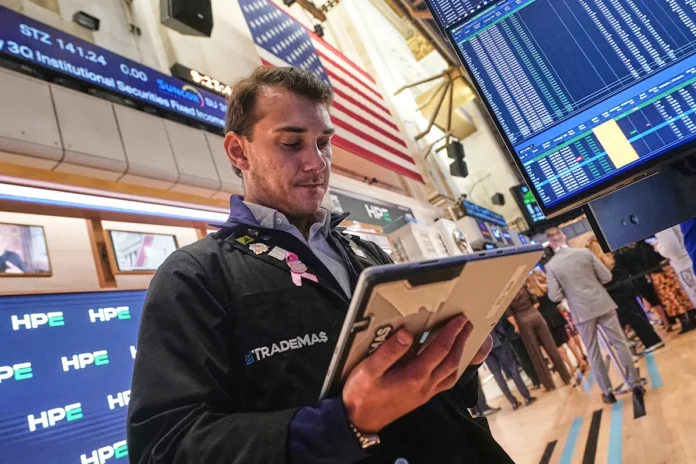NEW YORK (AP) — U.S. stocks fell on Thursday, hurt by drops for midsized banks as worries flare about the loans they’ve made.
The S&P 500 slid 0.6% in its latest up-and-down day after erasing a morning gain. The Dow Jones Industrial Average dropped 301 points, or 0.7%, and the Nasdaq composite lost 0.5%.
Zions Bancorp. tumbled 13.1% after the bank said its profit for the third quarter will take a hit because of a $50 million charge-off related to loans made to a pair of borrowers. Zions said it found “apparent misrepresentations and contractual defaults” by the borrowers and several people who guaranteed the loans, along with “other irregularities.”
Another bank, Western Alliance Bancorp, dropped 10.8% after saying it has sued a borrower, alleging fraud. It also said it’s standing by its financial forecasts given for 2025.
Scrutiny is rising on the quality of loans that banks and other lenders have broadly made following last month’s Chapter 11 bankruptcy protection filing of First Brands Group, a supplier of aftermarket auto parts. The question is whether the hiccups are just a collection of one-offs or a signal of something larger threatening the industry.
Thursday’s swings on Wall Street, where the Dow bounced from an early gain of 169 points to an afternoon loss of 472, fit the pattern of the week for stocks. They’ve been shaky since the end of last week, when President Donald Trump shattered a monthslong calm in the U.S. stock market by threatening much higher tariffs on China.
Thursday’s swoon erased an early morning gain driven by an encouraging signal about the artificial-intelligence boom.
Taiwan Semiconductor Manufacturing Co. reported a bigger jump in profit for the latest quarter than analysts expected. Chief Financial Officer Wendell Huang also said TSMC expects “continued strong demand for our leading-edge process technologies” going into the end of the year.
That’s important for the U.S. stock market because TSMC is a critical player in the AI frenzy, making chips for such companies as Nvidia. And Nvidia and other AI stocks have been central to Wall Street’s surge to records this year, even though inflation is still high and the job market is slowing.
AI-related stocks have shot so high that critics worry about a possible bubble, like the one that imploded for dot-com stocks in 2000.
U.S. companies broadly are under pressure to deliver stronger profits after the S&P 500 surged 35% from a low in April. To justify those gains, which critics say made their stock prices too expensive, companies will need to show they’re making much more in profit and will continue to do so.
Source link





